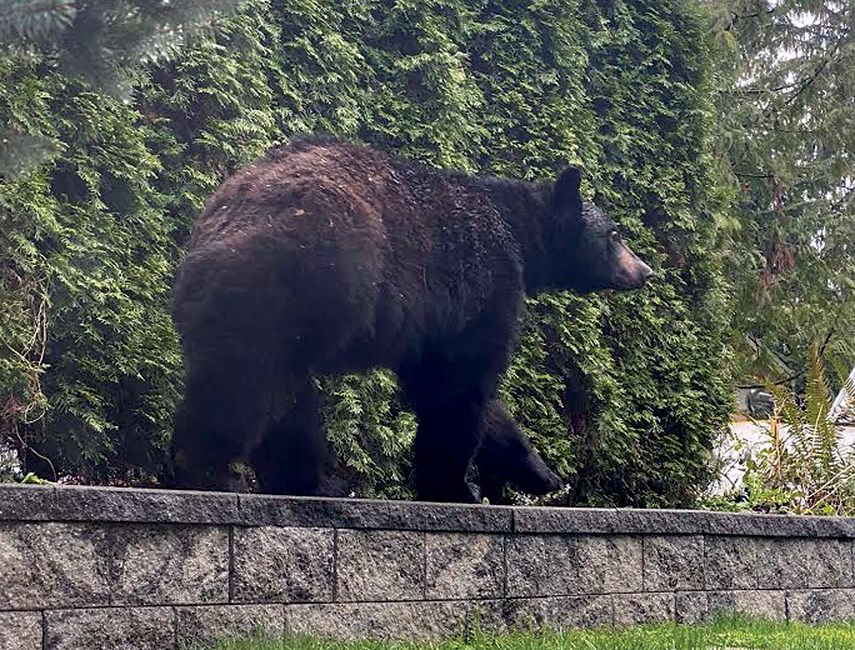A man who smashed a coffee mug on the head of a charging bear in North Â鶹´«Ã½Ó³»this week says the incident never should have been allowed to escalate so far.
“I want to send a message of peaceful coexistence – that this is a rare incident,” said Chris Springstead. “People are responsible and we failed this bear.”
Springstead was outside, having a coffee near Mosquito Creek along Montroyal Boulevard Tuesday (Oct. 11) when he noticed a black bear getting into someone’s garbage up the street.
“The bear just took one look at me, turned around and, head down, starting coming right at me, kind of like a walk with purpose,” he said.
Springstead felt the urge to turn and run, which he thankfully resisted, as that can trigger a bear to attack. Instead, he steeled himself, raised his arms to look big and “gave a little roar.”
Attempting to stand his ground, though, didn’t do the trick and the bear sped up to a gallop, Springstead said. What happened next, Springstead described as “like instinct.”
“At that moment, I realized, like, I'm in a heap of trouble here, potentially,” he said. “It started to come off the ground and its paws were coming up. I just swung down, as hard as I could, with a porcelain mug I had and it just exploded over his head.”
The bear reacted to the bonk on the noggin immediately and darted into the bushes before climbing a tree.
“I guess I got lucky,” Springstead said. “Like, one in a million. I couldn't even believe what happened.”
Conservation Officer Simon Gravel said the bear was likely not demonstrating predatory behaviour, but was acting to defend its food source. Usually, they will just bluff charge when that happens, he said.
“When we receive a report like this, obviously, we take it very seriously. This man was lucky. He had a very close encounter. He could have been injured by the bear,” he said. “He didn't do anything wrong. He did the right thing…. He had to hit the bear to defend himself.”
Gravel said he’s received many reports recently of bears going “garbage to garbage” and bluff charging people, particularly in the Montroyal area. Conservation officers have since set up a trap nearby, Gravel said.
“Everything kind of escalated over time,” he said. “Public safety is our priority and, as per our provincial guidelines, we can just simply not tolerate this kind of behaviour…. It will be put down, unfortunately.”
Bears are currently in their “hyperphagia” period, foraging up to 20 hours per day to take in any calories they can before winter. Gravel said, at this time of year, it’s best to back away when a bear gives any indication that people are getting too close.
Because of the North Shore's proximity to the mountains, forests and fish-bearing creeks, Gravel said wild bears will always be a part of life here. But he said there are still too many people needlessly drawing them into conflict with humans by leaving attractants like bird feeders, garbage, dog food and tree fruit.
“It’s unfortunately too common on the North Shore,” he said. “We have a lot of work to do as a community to change our behaviour.”
Since word has spread, Springstead said people have accused him of unnecessarily fear mongering about bears, but he said, that’s not the message people should be taking away from the incident.
“People on the street, their bins are still not locked up today,” he said. “Education is what's important here. We need to learn how to try to prevent this from happening again, because it's our fault, not that bear’s fault.”
North Shore Black Bear Society volunteers have been . The vast majority of North Shore residents “do everything right” and try to get their neighbours to do the same, said Christine Miller, the group's acting executive director.
“But it just takes one on a block,” she said. “It really takes 100 per cent compliance. We're really appreciative of all the people who are committed to doing it right.”
Miller said it’s the first time she’s heard of a bear coming within striking distance of a person without provocation in almost 20 years on the North Shore. But she said, Springstead was right to do what he did.
“That was definitely the right message to give the bear,” she said.
So far this year, four bears have been killed in interactions with humans on the North Shore – two after being struck by drivers on the highway, and two that were



